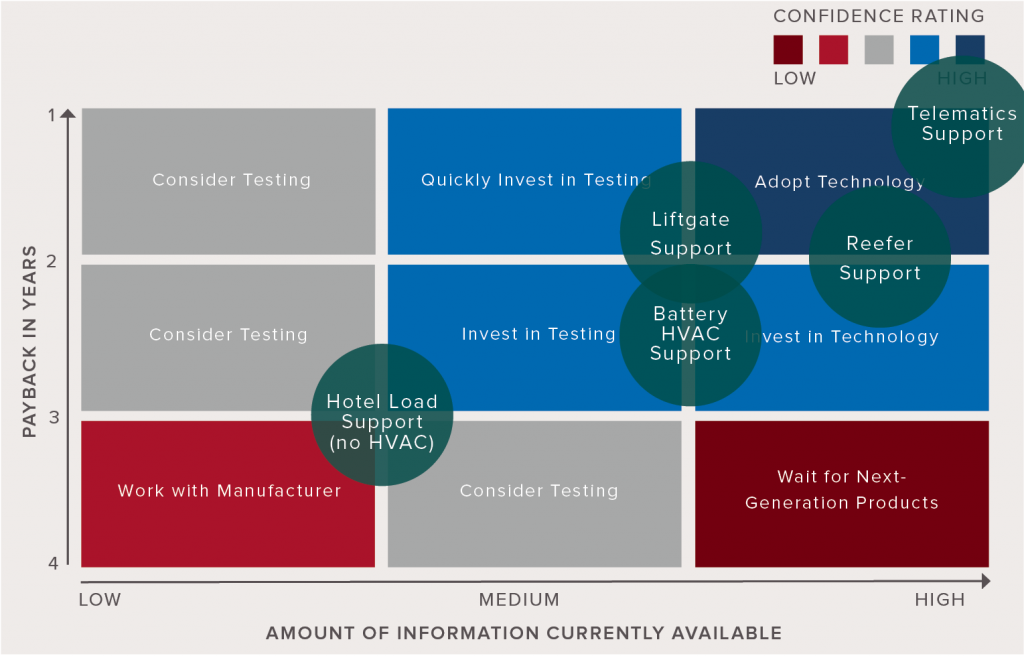Solar Panels –Trailer
Interest in solar panels is growing among fleet managers because the batteries are not able to meet the power needs of today’s trucks.

Solar panels designed for the trucking industry are almost all flexible, thin, lightweight, and capable of being affixed to even curved surfaces.
Trailers have traditionally been powered by the seven-way connector between the tractor and the trailer, which powers brakes, running lights, and blinkers. However, as trailers have evolved, a number of other electrical loads have been added to trailers that make the electrical system significantly more complicated. Many of these electrical demands can be supported by solar panels. Possible applications for trailers include support for liftgates, telematics, and refrigeration units.
The extra power available from the solar panel(s) can augment that coming from the engine alternator maintaining the batteries at a higher average state of charge, extending battery life.
A properly sized solar panel can provide additional current and battery charging capacity to help manage refrigeration units, electric liftgates and telematics devices.
Benefits
Location via Telematics
The use of solar panels on the trailer can allow GPS location systems to remain alive nearly indefinitely. This is a significant benefit to fleets for managing trailer locations.
Reefer Monitors
Refrigerated trailers are under increased requirements for temperature monitoring in food logistics. Solar panels can keep the monitor system alive and charged even without the tractor being connected.
Sensor Functionality
Trailer solar panels can provide battery power to implement new features such as trailer door monitoring, brake pads monitors, reefer temperature sensors and more. Some sensors can be wirelessly linked to the telematics system.
Liftgates
Solar systems can charge trailer liftgate batteries to insure the liftgate is always functional regardless of how often the trailer is being charged from the tractor. This can also minimize any idling required to run the liftgate.
Battery Life
Keeping a proper state of charge may extend the life of a trailer’s liftgate or reefer battery system. It may also reduce the roadside support calls to support these systems. Use of solar power may also eliminate using a DC-to-DC voltage converter to boost voltage of the trailer batteries.
Challenges
Trailer Ratio & Portability
Many fleets have 3 or more trailers for every tractor. Equipping all trailers could be costly since these systems are not portable from trailer to trailer.
Sun Exposure
Panels can only augment liftgate electrical systems during daylight hours. But opposed to tractor solar systems, the trailer systems are always on the top of the vehicle so directional issues during daylight hours are minimized.
Cleanliness
Dust, dirt and snow can reduce the solar conversion effectiveness. Check out stories of the Mars rover to see dust in the most extreme environments. The coatings on most panels minimize this issue.
Purchase Cost
Initial system cost and installation.
Variable Results
Latitude directly ties to the angle of the sun and length of solar exposure as well. Cloud levels vary by geographical regions as well.
Residual Value
It is unclear what the residual value for solar systems will be in the future.
Decision-Making Tools
The study team developed a tool to help fleets in making their decision about solar panels. The confidence matrix is used to inform fleets of the study team’s confidence in the technology being studied vs. the payback a fleet should expect to receive from the technology.

Conclusions
- Solar technology for trucks has progressed to the point where the panels on the market are flexible, thin, easily installed and reliable. Some applications, like supporting the batteries for trailer telematics systems, are an excellent application of the technology and should be strongly considered for future purchases. For other applications of solar technology, the cost versus benefits should be evaluated to see if it makes sense in the specific application.
- Fuel savings are generally a very small part of the overall benefit that comes from a solar panel installation.
- Solar panel installations need to be sized appropriately for their intended application.
- There is limited evidence at this point from fleets that the payback from the investment in solar panels matches that claimed by the solar panel suppliers. Benefits fall in several categories with the biggest benefits being from extending battery life and avoiding emergency roadside assistance for dead batteries.
Future Perspective
The field of solar as applied to trucks is a constantly and rapidly evolving one. The future might lead to improved technologies, cost reductions, more electrification of trucking loads, and extended trade cycles, all of which would make solar systems even more attractive and cost-effective for fleets.